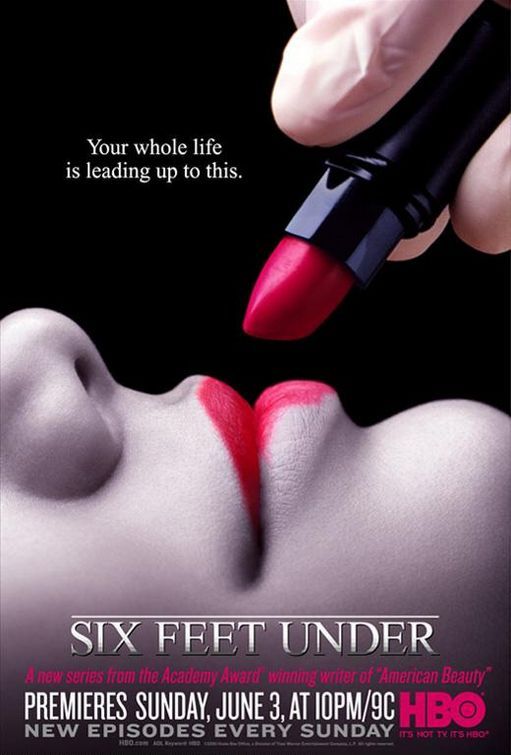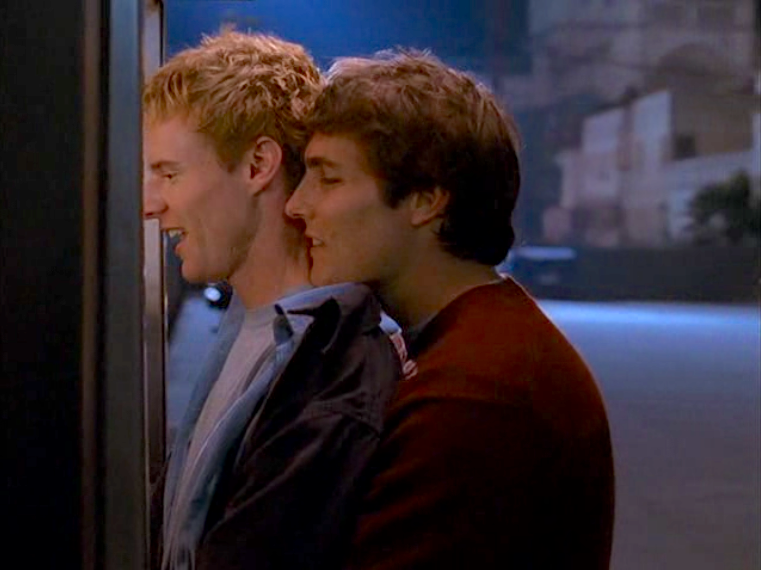HBO’s LGBT History: Six Feet Under (2001-2005)
 Wednesday, July 22, 2015 at 1:25PM
Wednesday, July 22, 2015 at 1:25PM Manuel is working his way through all the LGBT-themed HBO productions...
 Last week we talked about Cheryl Dunye’s Stranger Inside, a female prison drama that makes that Netflix series feel like a light-hearted romp. I highly recommend it; though, as with many of the films we’ve been looking at these past few weeks, it is not readily available for streaming (it is available on YouTube). This week, we pause on one of HBO’s greatest shows, Six Feet Under, which features one of the most fully realized gay male characters ever seen on television, David Fisher, played by Michael C. Hall.
Last week we talked about Cheryl Dunye’s Stranger Inside, a female prison drama that makes that Netflix series feel like a light-hearted romp. I highly recommend it; though, as with many of the films we’ve been looking at these past few weeks, it is not readily available for streaming (it is available on YouTube). This week, we pause on one of HBO’s greatest shows, Six Feet Under, which features one of the most fully realized gay male characters ever seen on television, David Fisher, played by Michael C. Hall.
Premiering as it did after The Sopranos and proving HBO’s swaggering arrival into prestige TV was no fluke, Alan Ball’s melancholy meditation on death, mental illness, and sexuality, nevertheless always felt, as David Fisher himself, like the dutiful, kinda gay, and oft-ignored middle child in HBO’s eyes; Six Feet Under thus lived (and died) in the shadow of its more popular and charismatic older brother.
That’s not a knock on David Chase’s drama but a reminder that Tony Soprano’s show was a gargantuan hit that’s since become the poster child for "HBO drama," if not for the entire “Golden Age of Television” writ-large. It both paved the way and reaped the benefits of the daring work showrunners like Tom Fontana (Oz), David Simon (The Wire), Daniel Knauf (Carnivale), Steven Soderbergh (K Street), and, of course, Ball himself, were producing during the early 2000s.
Ball’s series feels like an outlier among those early HBO dramas; Six Feet Under, more expertly than Ball’s Oscar-winning film, American Beauty and with more nuance than his later vampiric sudfest, True Blood, thrives on that much maligned genre which earns immediate scorn, melodrama. Indeed, with its focus on grief and mourning, the show constantly wears its teary-eyed heart on its sleeve, shamelessly tugging at its audience’s heartstrings. [More...]
“A Private Life,” (S1E12) written by Kate Robin (who now works on Showtime’s The Affair) and directed by fellow Colombian Rodrigo García (of Mother and Child and Albert Nobbs fame), is a perfect example of the show’s ability to channel its weepie sensibility towards ambitious ends.
The first scene, which takes place at an ATM, establishes the easy intimacy of a young gay couple before a trio of men (“You think you can do offensive shit like that in public?”/“Read a fucking Bible you pervert!”) beat one of them to death. The other narrowly escapes. García’s camera lingers on Marcus’s limp body even as his attackers flee the scene. It is one of the many moments in this episode where the show steadies its focus on uncomfortable, ugly, and otherwise, unwelcome sights (elsewhere, this episode also features Jeremy Sisto going capital letter CRAZY on Peter Krause's Nate Fisher and Lauren Ambrose dealing with her boyfriend's recent drug overdose scar). But if the visuals provocatively echo the horrific hate crimes that had finally taken over mainstream media with Matthew Shepard’s death in 1998, and the heated religious conversations which followed it, it is the writing that really shines in this episode. In rewatching “A Private Life” in preparation for today’s post I had to stop myself from jotting down every line in the gay-related scenes.
Take the scene where Marcus’s parents find themselves voicing many a viewer’s thoughts, in, perhaps too blunt a terms, about why their son had to die the way he did.

Why does a thing like this happen?
Come on, now, we all know why something like this happen.
That is not a reason!
It’s the only reason. If he wasn’t… he’d be alive today.
You know, I was always so worried about AIDS, I never thought that just being out on the street... what is wrong with people?
Marcus’s mom rightly points out that her husband can’t even bring himself to say “it”; conspicuously, neither can she. But within their exchange you can feel the many unspoken conversations that lead Marcus to keep his sexuality to himself. Here we witness the way indifference towards the LGBT community, and an unwillingness to speak about homosexuality in particular, is just as damaging as the scariest spectre of gay life: AIDS. It is definitely just as insidious and dangerous.
Marcus’s body, brought in to Fisher & Sons to be readied for viewing later that week, prompts David to face his own closeted homosexuality, seeing in Marcus’s ghost a reminder of his own inner demons:

There are people who love you.
But not as many that hate me. And you.
And, of course, that ending, wherein David gets down on his knees and prays, “Help me, God. Please, help me” is heartbreaking. There is no catharsis for David. No absolution. The haunting which Marcus’s death literalizes is not exorcised once David stands up for him at his funeral; not waved away when he comes out to Rico (“I may not dress like Jackie Kennedy but I have sex with men”); not vanquished when he comes out his mother and voices his own projected self-hatred (“I know you love the part of me that is your son”). It merely becomes a part of him he’ll wrestle, little by little, day by day. Neither didactic nor despairing, Ball’s series always aimed instead for the very thing the Golden Age of Television is constantly hailed for: verisimilitude.


Fun Awards Fact: In its 25 year history, only five shows have claimed the GLAAD award for Best Drama Series more than once: LA Law (1990, 1991), Chicago Hope (1997, 1999), NYPD Blue (1996, 1998) and two family-centered melodramas: Six Feet Under (2002, 2003, 2005) and Brothers & Sisters (2007-2010). And yes, I’d rather talk about the show’s performance at the GLAAD awards because I refuse to talk about the fact that Michael C. Hall was only once Emmy nominated for his nuanced portrayal of David Fisher.
Next Week: We talked at length about how 1998 was a pretty gay year for HBO, but it was also marked by tragedy (not unlike that depicted in "A Private Life"): the horrific murder of Matthew Shepard shook the nation October that year and we will get to talk about that episode at length when we look at The Laramie Project. It’s a star-studded film adaptation of Moises Kaufman’s documentary play of the same name. Watch on HBO Go & Amazon Prime.
 Alan Ball,
Alan Ball,  Emmy,
Emmy,  HBO,
HBO,  HBO LGBT,
HBO LGBT,  Michael C Hall,
Michael C Hall,  Six Feet Under,
Six Feet Under,  TV,
TV,  The Sopranos
The Sopranos 



Reader Comments (13)
I am rewatching this series from the beginning, now starting Season 3, and it's just as emotional and intense as I remember. The acting is some of the highest-caliber I've ever seen on TV. How did Frances Conroy not win an Emmy for this!
Good synopsis. I absolutely love Six Feet Under, which may have had the most pitch-perfect, satisfying ending of any series in TV history. That said, I'm in the (likely small) camp who found the Fisher clan (particularly the brothers) largely, painfully insufferable. Claire's evolution was quite fascinating -- Lauren Ambrose is such a fine actress -- but for me the character whose arc was by far the most interesting and who felt truly lived-in, real and touching is the much-pilloried, oft-maligned Brenda. Rachel Griffith was never anything but ridiculously watchable, shading a flawed, complicated and at times frustratingly self-destructive character (who incidentally was an incredible gay ally if ever there was one) with a maturing warmth and lovely, poignant little grace notes. I personally felt a stonger connection to and investment in her journey than anyone on the show.
Favorite show of all time-- not just because as a gay man I so identified with David Fisher. I sometimes identified with Clare and even Ruth more. And I agree with Mareko-- who would have thought the awful Brenda would evolve into such a sympathetic character by the end of the show? (Love Rachel Griffiths and also need to give a shout out to one of my favorite, under-appreciated actresses, Joanna Cassidy, as Brenda's truly terrible mother!)
The characters are flawed, often unikable, and rarely learn from their mistakes. They always feel very real emotionally, even when the plot turns are melodramatic (secret affairs, secret pregnancies, brain tumors, kidnappings, etc.).
Not surprising given its setting, the show also depicted death and mourning very realistically. I re-watched the first season after my own father died, and was surprised at how the emotional beats of the characters matched my own experience.
Given that you're focusing on the show's gay content, I'm surprised you didn't mention David's boyfriend (and later husband) Keith. Best love relationship between two men ever depicted on TV.
Emmys treated like shit this show. Still one of the best things I've ever seen on TV.
Given that you're focusing on the show's gay content, I'm surprised you didn't mention David's boyfriend (and later husband) Keith. Best love relationship between two men ever depicted on TV.
I concur...although I have a certain soft/blind spot when it comes to Oz's Beecher-Keller "romance."
Truly, the ultimate BEST Endling of ALL Series!!!! Love the charakters to death.
Lili Taylor ruined Six Feet Under. And the family member who dies in season 5 was such a bastard in the end I was glad he died.
Brookesboy--absolutely right! I'm too chicken to watch American Horror Story, so I surely miss Frances Conroy.
"what part of you isn't my son?"
oh, ruth fisher, always trying so hard to understand her children
michael c hall: nominated once as a man who loves men, nominated five times as a man who kills 'em
Biggs & Paul, my first draft of this post had an aside about Keith & David but since the former is only briefly in this ep, I ended up nixing it though now that you mention it, it does seem odd to not have gushed over their great, complicated romance throughout the show's run. As we keep adding more TV and films, I may end up doing a post solely on "HBO gay couples" which these two most certainly would top.
par, I have to believe those first couple of Dexter noms were partly apologies for ignoring his strong work for so long!
That couples post sounds great, Manuel. Please do!
"michael c hall: nominated once as a man who loves men, nominated five times as a man who kills 'em"
His character in Dexter also kill women.
The only series that made me cry buckets. I was a WRECK with the finale. Thank God I watched it after it aired so I could at least pause the video since my tears were obscuring my vision.
I went up and down when it came to liking/hating the characters...
Except for David. My love for him NEVER faltered.